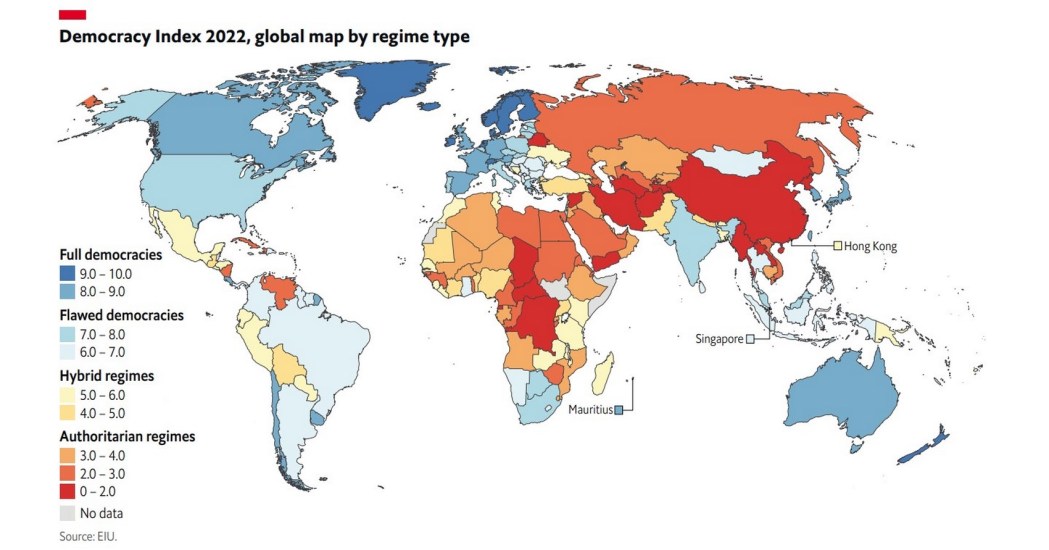Hong Kong has fallen three positions in the latest global democracy index compiled by the Economist Intelligence Unit (EIU), as the think tank attributed the decline to an exodus of experienced civil servants in response to the “deteriorating political situation” in the city.

Hong Kong placed 88th among 167 countries and territories in the Democracy Index 2022 with an overall score of 5.28 out of 10, an all-time low since 2006 when the indicator began. It ranked below Liberia (86th) and Ukraine (87th), according to the report released on Wednesday.
The overall score was an average based on five categories. It scored 2.75 in “Electoral process and pluralism,” 3.29 in “Functioning of government,” 5.56 in “Political participation,” 6.88 in “Political culture” and 7.94 in “Civil liberties.”
Norway remained the top-ranked country in the 2022 index, followed by New Zealand and Iceland. Taiwan ranked second highest in the Asia and Australasia region with a score of 8.99, while China, which scored zero in “Electoral process and pluralism,” received 1.94 marks in total and placed 156th globally.
The bottom three countries were North Korea (165th), Myanmar (166th) and Afghanistan (167th).

Both China and Hong Kong were said to have suffered “significant deteriorations.” The EIU analysts described Hong Kong’s democracy as being “in retreat,” saying that the city’s position continued to fall because the quality of the civil service was undermined by a mass departure of experienced government staff in 2022. They were said to have left the public service in response to a worsening political situation and the “shrinking space of freedom.”
The Hong Kong government saw 3,734 civil servants quit in the year 2021-2022, according to figures provided by the Civil Service Bureau in July last year. A document submitted to the Legislative Council earlier this month showed that 944 people quit the civil service in three months last year, between April 1 and June 30.
The think tank also cited the Beijing-imposed national security law, as well as a decline in press freedom and academic freedom in the city.
“[T]he enforcement of the national security law is making it increasingly difficult to organise independent trade unions… these setbacks come on top of the erosion of media and academic freedoms that has occurred in recent years,” the report read.
Rights ‘enshrined’
In response to HKFP’s enquiries, a spokesperson said the government “strongly opposes the politically-biased, untruthful and misleading comments by the Economist Intelligence Unit” and that the electoral overhaul helped achieve long-term stability: “It is therefore a good democratic system which suits the actual situation and the development needs of Hong Kong.”

They added that rights are enshrined in the Basic Law, with press freedom, free speech, academic freedom and the right to form unions protected: “These specific and clear safeguards provided for in accordance with the Basic Law have not been altered in any way and remain in full force.”
The spokesperson said that, although rights are guaranteed under the security law “such rights and freedoms are not absolute” and may be restricted for security and safety reasons under the International Covenant on Civil and Political Rights.
They denied there was any “so-called exodus” from the civil service, saying that staff rotations and retirements were normal.
Security law
The sweeping legislation that came into force in June 2020 targets secession, subversion, collusion with foreign forces and terrorist acts, which were broadly defined to include disruption to transport and other infrastructure.
The move gave police sweeping new powers, alarming democrats, civil society groups and trade partners, as such laws have been used broadly to silence and punish dissidents in China. However, the authorities say it has restored stability and peace to the city.
As of January 20, 243 people had been arrested over suspected acts and activities that endangered national security since the legislation was enacted, according to data provided by the Security Bureau. Among them, 149 people and five companies had been charged so far.
Support HKFP | Policies & Ethics | Error/typo? | Contact Us | Newsletter | Transparency & Annual Report | Apps
Help safeguard press freedom & keep HKFP free for all readers by supporting our team

HKFP has an impartial stance, transparent funding, and balanced coverage guided by an Ethics Code and Corrections Policy.
Support press freedom & help us surpass 1,000 monthly Patrons: 100% independent, governed by an ethics code & not-for-profit.










